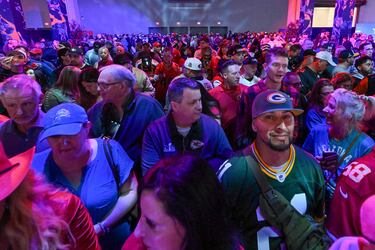What if the biggest event in North American professional sports moved from Sunday to Saturday?
The analysis shows that shifting one day could save the US economy over $5 billion annually by reducing workplace truancy and increasing productivity.


Have you ever found yourself getting carried away with Super Bowl celebrations on a Sunday night in February, only to wake up the next day with a pounding headache and a feeling of regret as you prepared for work? Or perhaps you didn’t even bother going to work and called in sick without hesitation?
The Super Bowl is the much-anticipated culmination of the National Football League season, with the game traditionally held on the second Sunday in February. However, some people have suggested that moving the game to a Saturday might be better. The reasoning behind this is that many viewers have work obligations the following day, which can make it difficult for them to enjoy the festivities and let loose fully.

Despite the idea being raised at the highest levels of the NFL, Commissioner Roger Goodell has already dismissed the notion of moving the Super Bowl to Saturday. While it may be disappointing for those who would prefer a weekend celebration, it looks like the traditional Sunday night slot is here to stay.
“That has been around for a long time, people have talked about that,” Goodell said on “The Kyle Brandt Football Experience” in December 2018. “The reason we haven’t done it in the past is simply just from an audience standpoint. The audiences on Sunday night are so much larger. Fans want to have the best opportunity to be able to see the game and we want to give that to them, so Sunday night is a better night.”
The numbers don’t lie
Well, the SportsBookReview has examined four key areas to determine whether the shift from Super Bowl Sunday to Super Bowl Saturday would have a positive or negative impact, and this is what they found
- Roughly 1 in 5 employed Americans miss or turn up late to work on Monday.
- Adjusted for the US employed population, that's an estimated 26.6 million potentially out of action.
- An additional 11.5 million people said they would either arrive late or leave early.
- Almost 22 million employees will watch the game in some form during working hours.
- Employees spent an average of 10 minutes each day discussing the Super Bowl, managing office pools, or doing game-related research in the days leading up to the matchup.
- Monday absences, lateness/early departures and post-game discussions account for $3.7 billion drop in productivity.
According to the report, American workforce productivity will experience a significant decline of over $5 billion during the week of and the day after the Super Bowl. The study also examined the impact of moving the Super Bowl to Saturday and found that although it could result in a drop in workplace productivity, it could also lead to a significant loss of consumer spending, which could decrease by as much as 45.3%.
The report suggests that the drop in productivity is due to several factors, including the high number of employees who take time off to watch the game, those who come to work tired or hungover, and those who waste time discussing the game instead of working.
Related stories

Deebo Samuel's injury status for the Super Bowl

Super Bowl countdown
While there could be a drop in workplace productivity, it could also lead to a significant loss of consumer spending. The report estimates that consumer spending could decrease by 45.3% if the Super Bowl were held on a Saturday, as many people would opt to stay home and watch the game instead of going out and spending money.
The report also examined the impact of moving the Super Bowl on TV and ad ratings and alcohol consumption. While the ratings may improve if the game were held on a Saturday, the report suggests that alcohol consumption could increase, leading to a higher number of accidents and injuries. Overall, the report suggests that moving the Super Bowl to a Saturday would have positive and negative consequences and require careful consideration and planning.
